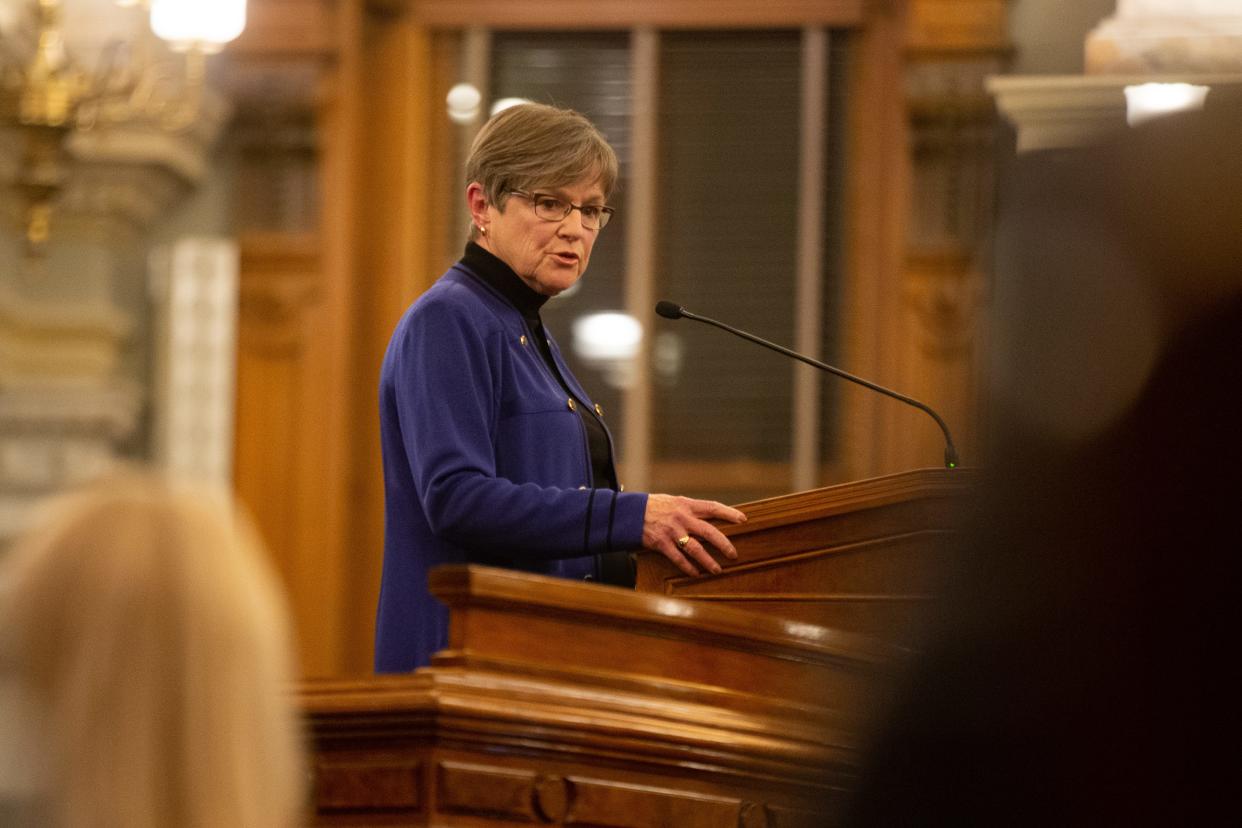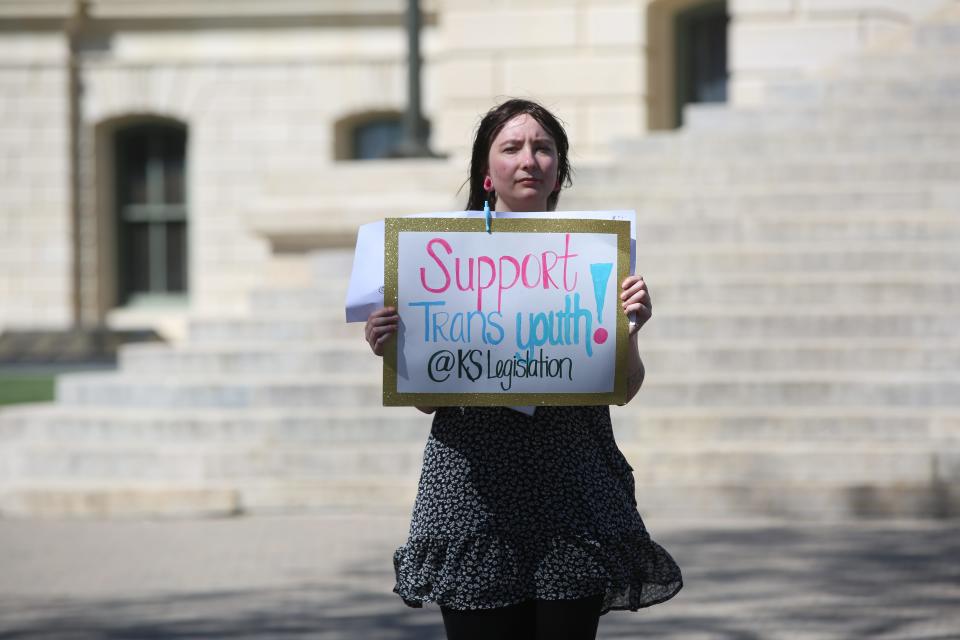Kansas Gov. Laura Kelly rejects transgender bathroom bill, gender-affirming care ban

- Oops!Something went wrong.Please try again later.
Gov. Laura Kelly vetoed a slate of anti-transgender bills Thursday, including a sweeping provision that could require trans individuals use bathrooms and other facilities based on their sex assigned at birth and a separate ban on gender-affirming care for youths.
The move sets up a showdown with the Legislature on the four bills, with lawmakers set to return to Topeka next week to attempt to override her vetoes, as they did with a ban on transgender athletes in women's sports earlier this month.
Kelly has vowed to veto any bill that she said attacks transgender Kansans, saying in her veto message that the bills would threaten the state's efforts to pursue economic development opportunities. She rhetorically asked in her veto message: "I’m focused on the economy. Anyone care to join me?"
"Companies have made it clear that they are not interested in doing business with states that discriminate against workers and their families," Kelly said. "By stripping away rights from Kansans and opening the state up to expensive and unnecessary lawsuits, these bills would hurt our ability to continue breaking economic records and landing new business deals."
More: Sweeping Kansas bill on transgender bathroom use, driver's licenses headed to Gov. Laura Kelly
Senate Bill 180 would redefine sex in state law to potentially mandate transgender individuals from using bathrooms, changing rooms, prisons and domestic violence shelters than align with their sex assigned at birth.
It also would require individuals be counted as their sex assigned at birth and prevent transgender residents from changing their sex or name on a drivers license or birth certificate.
Critics say the proposal effectively erases transgender individuals in Kansas, though the bill's supporters argue the language is necessary to protect women in public facilities.
In a statement, House Speaker Dan Hawkins, R-Wichita, said the governor "has chosen to side with left-wing activists who seek to change the definition of a woman and ignore the biological differences that exist between the sexes."
"House Republicans believe biological females in Kansas deserve privacy, safety, and dignity in singlesex spaces and are dedicated to ensuring the current laws that have historically protected that right cancontinue to do so," Hawkins said.
Concerns have been raised about the bill's impact on state agencies. The Kansas Coalition Against Sexual and Domestic Violence has said that $17 million in federal grant funding could be at risk and state hospitals and state prisons could become non-compliant with federal law, meaning a risk of further lost funding.
More: These Kansas bills could endanger transgender inmates. Here's what prison officials say.
Both chambers have a path to a veto-proof majority, though the House would need to have two Democratic lawmakers — Reps. Ford Carr, of Wichita, and Marvin Robinson, of Kansas City — vote for the bill. Three GOP legislators voted against the measure in the House as well.
Kelly vetoes ban on gender-affirming care for trans youth

Lawmakers have a much tougher path to override Kelly's veto on the gender-affirming care ban. While lawmakers have a path to the required two-thirds majority on the bill in the Kansas Senate, 14 Republicans voted with nearly all Democrats to oppose the bill in the Kansas House.
Senate Bill 26 would allow individuals to sue doctors who perform gender-affirming care if they regret the decision later in life, though the statute of limitations would be limited to the three-year window after an individual turns 21 years old.
More: In late night vote, Kansas Legislature bans gender-affirming care for trans youth
Gender-affirming care encompasses a wide range of health care to support a person’s gender identity when it conflicts with their gender assigned at birth.
The LGBTQ community has argued that it can be a crucial way for making young transgender people feel supported, and the nation’s largest medical groups have said the treatments can be important in boosting the mental health of an otherwise vulnerable population.
“This is my choice and that is no one else’s choice because it is my body and it is how I feel,” Logan, a 16-year-old transgender student, said at a Statehouse rally earlier this month.
Proponents of the ban, however, argue that minors are too young to make significant life decisions.
"By any reasonable standard, governing from the middle of the road should include ensuring vulnerablechildren do not become victims of woke culture run amok," Senate President Ty Masterson, R-Andover, said in a statement.
Overnight trip requirements and jail changes also rejected by governor
Kelly also rejected House Bill 2138, which in part mandates school districts separate students by their biological sex for rooming assignments on school sanctioned trips.
More: Kansas lawmakers want to separate students by sex assigned at birth on overnight trips
The bill is in response to a 2021 incident in Eudora, where a female student was assigned to share a bed with a transgender peer on a trip to Costa Rica. When the girl said the arrangement made her uncomfortable, she was ignored, parents say.
“The fact of the matter is the majority of school districts do not have an overnight travel (policy) and who's going to share the room with whom and what accommodations are we going to make for students to best address the needs so that all students who are on overnight travel feel safe," Sen. Molly Baumgardner, R-Louisburg, chair of the Senate Education Committee, said on the Senate floor.
Critics, including a range of education groups, said the bill was overly prescriptive and that districts could address the matter locally.
"It also takes an issue that can be – and currently is – solved at the level closest to the student to a level that inherently cannot include nuance and grace that our kids deserve," Senate Minority Leader Dinah Sykes, D-Lenexa, said in a statement.
More: Now that Kansas has a ban on transgender athletes in women's sports, here's what comes next
And Kelly vetoed Senate Bill 228, legislation initially intended to modernize the state's jail statutes. Lawmakers added in language that could have required jails segregate inmates based on their sex assigned at birth, mirroring the definitions in SB 180.
"This requirement means that all Kansas jails would be in violation of federal law, opening them up to litigation and the loss of federal funding," Micah Kubic, director of the ACLU of Kansas, wrote in a letter to Kelly earlier this week, urging her veto on a slate of bills, including SB 228.
In a separate statement, Hawkins slammed the veto, referencing the informal holiday celebrating marijuana in saying that "today being 4/20, one must question what the Governor was smoking when she made this ludicrous and dangerous decision.”
This article originally appeared on Topeka Capital-Journal: Gov. Laura Kelly vetoes trans bathroom bill, gender-affirming care ban

